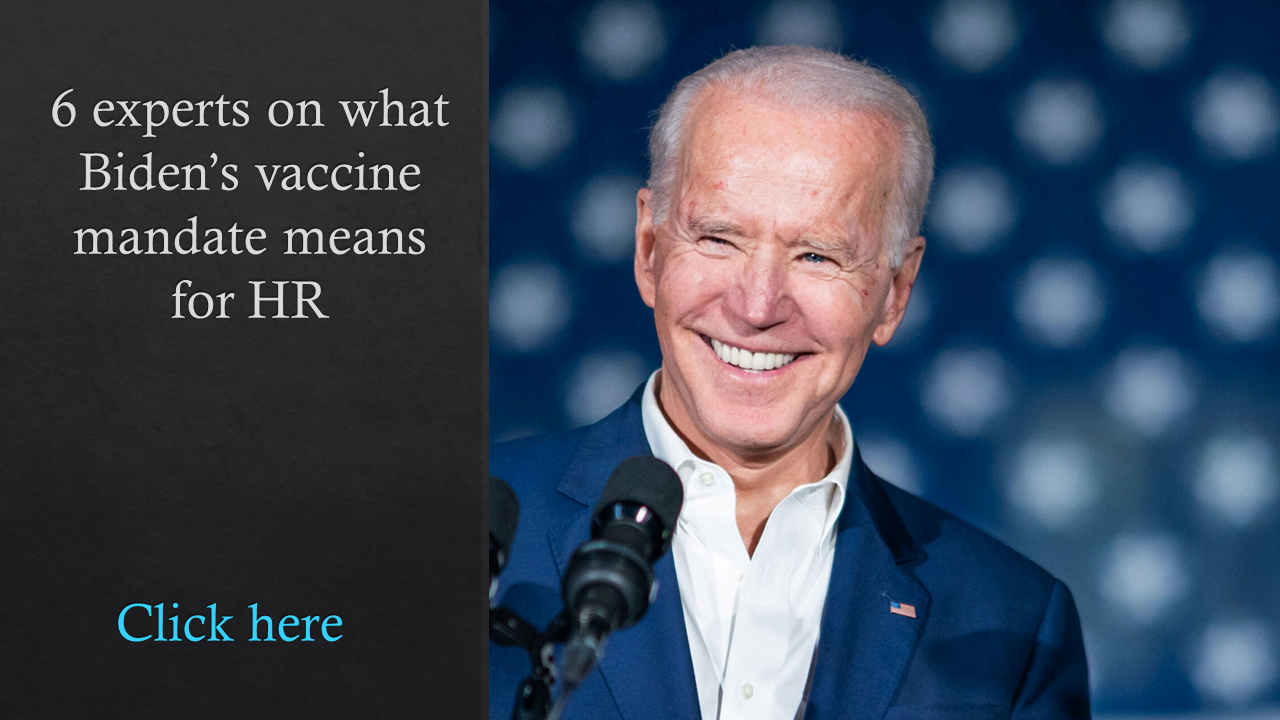With President Biden’s recent announcement that employers with at least 100 employees will soon need to start mandating vaccines or requiring weekly COVID-19 testing–all while companies continue to debate safely having employees return to the office–a new breed of HR technology has emerged to advance workplace safety in the age of COVID: vaccination tracking tools.
Vaccination tracking tools work as either stand-alone applications that operate through employees’ smartphones or that reside in an organization’s HR portal. Some tracking solutions allow employees to upload their vaccination card or permit an HR representative to verify that the vaccine card is not fraudulent. Others are being developed that can track which employees have received COVID-19 booster shots as well as standard seasonal flu shots. And some can even be used to provide proof at establishments outside of the workplace that a person has been vaccinated.
Regardless of the focus of the growing number of tools hitting the market, it’s clear that demand is high.
Vaccination tracking apps are yet another tool that HR leaders may have to deploy to manage pandemic-related challenges, says Rebecca Wettemann, CEO and principal at Valoir, a technology industry analyst firm, and a 2021 Top HR Tech Influencer. Given the evolving landscape of vaccine requirements and mandates, she says, tracking apps take the burden off HR and let technology do the work so HR can focus its energy on creating related plans and policies, and ensuring employee wellbeing.
-

Rebecca Wettemann
“Vaccines have become a very charged and emotional topic. Taking a technology-first, data-driven approach can help to insulate HR from confrontation while giving them a solid audit trail around how vaccine policies are being consistently implemented and enforced,” says Wettemann.
That’s especially important given how quickly employers are having to pivot when it comes to COVID-19. For instance, after Biden’s recent mandate announcement, some organizations had to reconfigure return-to-the-workplace plans.
“The biggest challenge for organizations in general has been having to constantly manually update according to the latest information and regulations,” says Jim Wetekamp, CEO of Riskonnect, which offers an app called COVID-19 Immunization Tracker in its cloud-based portal. The solution “gives organizations the ability to keep up with regulatory changes automatically … no matter how these mandates and regulations evolve,” he says.
While such tools can be a boon for HR, most are designed with employee preferences as top of mind.
Alight Verify, provided by HCM solution provider Alight, allows employees to verify their vaccine status via their preferred channel, where they can provide vaccination information, request a vaccine exemption or schedule regular coronavirus testing.
“This personalized outreach continues with timely information and calls to action, including when additional requirements, such as recommended and available booster shots, need to be met,” says Karen Frost, senior vice president, health strategy & solutions at Alight, whose first Alight Verify client went live this week.
Personalization is one advantage of some vaccine tracking tools, while the ability to give employees more control over their health information is another.
See also: 9 tips for telling your workers about your new vaccine mandate
A mobile app from Express Scripts, a pharmacy benefit management provider, allows employees to present their vaccination details, including the dates of each jab and the vaccine manufacturer. There’s also an option to create and share a scannable QR code to show proof of vaccination, says Dr. Glen Stettin, the chief innovation officer for Evernorth, a healthcare services portfolio that is a subsidiary of Cigna and offers Express Scripts services.
“It puts people in control of their own health information, which is becoming essential to the future of safe travel, work, school and dining,” says Stettin. “People are relieved knowing they don’t have to carry their card and worry about losing it.”
And for employers, it’s all about bolstering compliance, Frost says. “[With vaccination tracking tools,] employers gain data-driven insights that reveal vaccination trends across their workforce, so they’re able to make more informed decisions around staffing and mask and testing requirements.”
Trust, yet verify
For ADP, its approach to vaccine tracking is rooted in employee surveying.
Through the ADP mobile app, HR leaders can poll their colleagues about vaccination status. Employees who answer that they have been fully vaccinated will be asked in the mobile app to share their vaccination date and upload images of their vaccination card and doctor notes. Leaders are then able to view this data through the ADP portal in case they need to cross-check it, says David Palmieri, vice president and general manager at ADP.
“Trust and verify,” adds Palmieri.
Related: 6 experts on what Biden’s vaccine mandate means for HR
So far, more than 3,100 ADP clients have adopted the solution since its July 10 debut, with approximately 2.5 million surveys completed. “The only major challenge is that employees can only answer the vaccination surveys through the ADP Mobile app and some users don’t have access to smartphones,” says Palmieri, adding that ADP is working to make the solution available for employees through the ADP portal as well.
 Verification is also key for ID.me’s COVID-19 Vaccine ID, a solution that publishes an employee’s vaccination status in a digital wallet app after the employer has verified the information.
Verification is also key for ID.me’s COVID-19 Vaccine ID, a solution that publishes an employee’s vaccination status in a digital wallet app after the employer has verified the information.
Here’s how ID.me’s tool works: Employees take a photo of their vaccination card or other proof of vaccination, such as a state immunization record, health provider record, SMART Health card or negative test result within 72 hours. Then, ID.me’s document review team examines the materials and either accepts or rejects them. The average response time is under 90 seconds, says Blake Hall, CEO and founder of ID.me.
“ID.me designs for inclusion-first, so the credential can be shared from a mobile phone or web page, a native app or printed as a paper copy,” Hall says. “We also verify test results.”
Employees have the option of sharing their vaccination status online after they log in and give consent to share with an organization, HR department or employer portal. They can also display their Vaccine ID for in-person access to the workplace, says Hall.
Currently, ID.me’s COVID-19 Vaccine ID product only supports COVID-19 vaccine verification but the company may expand coverage in the future. It will support COVID booster shots once the FDA and CDC issue guidance regarding booster shots.
Vaccination fraud is a real concern for many employers looking to ensure a safe workplace, making scrutiny a cornerstone of several tracking applications.
“Identity verification provides a significant deterrent, as fraud can be attributed directly to the person who submitted the fraudulent document,” says Hall, who compared some vaccination credential apps to “glorified photo storage apps.” ID.me instead uses sophisticated machine learning technology to detect fraudulent document templates, he adds, “so we can spot patterns that would otherwise go undetected.”
Meanwhile, Welltok Verify’s turnkey solution uses AI validation to verify uploaded records, including test results, vaccination cards and materials relating to exemption requests. The self-reporting tool is built on a cloud-based, mobile-response web app and features an online reporting dashboard that provides HR leaders with a view of compliance and status.
So far, clients have expressed interest in the app but it hasn’t launched at any client sites yet, says Jeff Yoshimura, vice president of product management, Welltok.
Qualtrics recently launched Vaccination & Testing Manager, an app that captures information on their employees’ vaccination status as well as conducts daily symptom checks via text, email or QR code.
Employees can submit their information from home before they head to work or from their phone right before they enter their company’s building, says Benjamin Granger, Ph.D., an organizational psychologist and head of employee experience advisory services at Qualtrics.
Louisiana State University is a Qualtrics client, which uses the solution to ask students, faculty and staff about their symptoms daily and perform contact tracing. The school recently expanded its use of the program to include COVID-19 testing scheduling and vaccine management.

